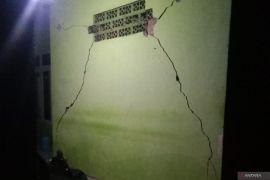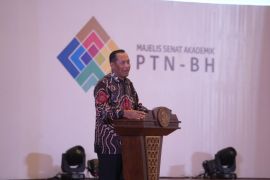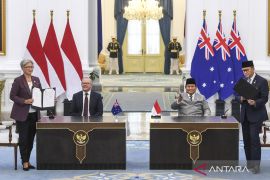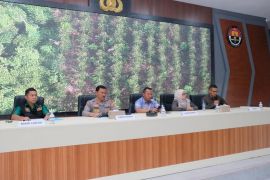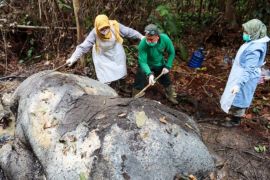The restoration project covers an 8.5-kilometer section from the Manggarai Sluice in South Jakarta to the Istiqlal Mosque Bridge in Central Jakarta. The work on the project is expected to be completed by the end of 2014.Jakarta (ANTARA News) - The central and regional governments are cooperating to restore the water quality of Ciliwung River to solve the various problems such as annual flooding that impacts the capital city during the rainy season.
"The Ciliwung River is dirty and often causes floods. We want to show that it can also remain clean. The Ministry of Public Works, the Ministry of Environment, the Jakarta Government, and South Korea are cooperating to restore the function of an 8.5-kilometer section of the river," Deputy Minister for Public Works Hermanto Dardak stated in a written statement here on Tuesday.
Currently, waste water processing installation (IPAL), waterscape and environment training center facilities are being built in certain locations of the river, he remarked.
"We want to showcase a model by restoring the rivers ecological function to improve the quality of its water," Hermanto explained.
The government wants to demonstrate to the people that the Ciliwung River can be restored. It also intends to provide education to the public on ways to imbibe a clean river culture and to improve the quality of water and restore the river.
The deputy minister for public works pointed out that the restoration project covers an 8.5-kilometer section from the Manggarai Sluice in South Jakarta to the Istiqlal Mosque Bridge in Central Jakarta. The work on the project is expected to be completed by the end of 2014.
Earlier, the Ministry of Public Works had implemented a similar project on the Eastern Flood Canal that is 23.5 kilometers long and 70-100 meters wide. It has served as a green canal model.
With regard to the efforts to handle garbage, excavators have been deployed at several points in the Ciliwung River to clean the refuse.
In the meantime, the administration of Bekasi, a buffer city of Jakarta, expressed optimism that the repair work of the Bekasi River dykes will be completed before the onset of the rainy season.
The repair of the dykes, which will cost around Rp10 billion, is expected to reduce the impact of flooding in the West Java city, Tri Adhianto, the head of the city highway construction and water system, noted.
"We decided to carry out repairs during the dry season. Work would be hampered if we do it in the rainy days," Tri pointed out.
The dykes are built in several places that are prone to flooding in the rainy season.
The river banks in the city are crowded with residential areas such as Pondok Mitra Lestari, Pondok Gede Permai, and Telukpucung complexes.
"Altogether, there are around seven dykes to be repaired and reinforced before the next rainy seasons," he affirmed.
He believes that the rapid process of urbanization in the upstream areas in Sentul is partially responsible for the flooding in Bekasi.
He pointed out that unless urbanization is curbed in the upstream areas of Bekasi, including Cileungsi and Cikeas, Bogor, it will continue to face the yearly threat of flooding
The hilly areas in Sentul, which were formerly covered by forests, are now lined with villa houses and other commercial buildings, thereby leaving hardly any empty spaces for holding the rain water, he added.(*)
Editor: Heru Purwanto
Copyright © ANTARA 2014

